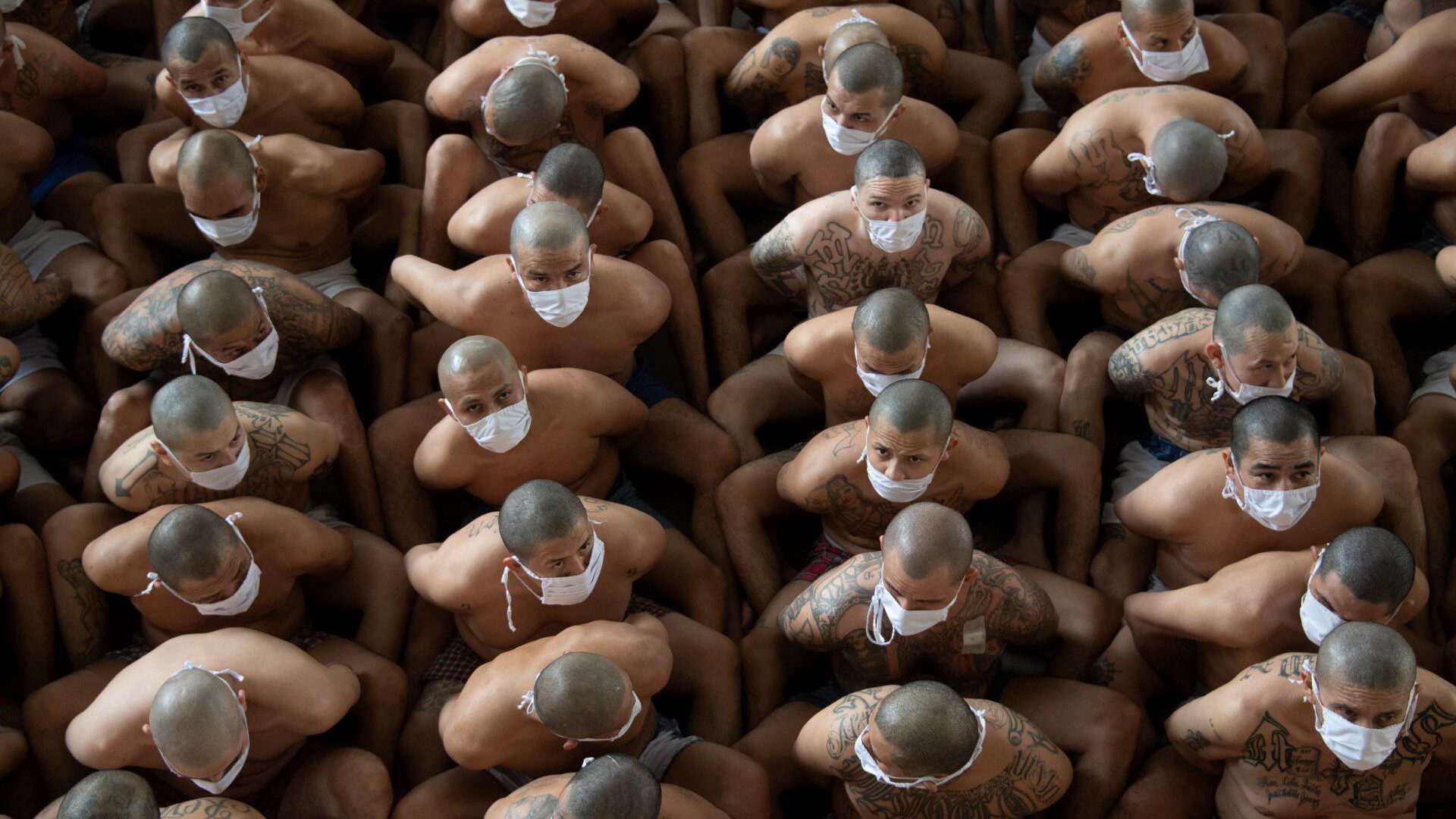
Members of the MS-13 and Barrio 18 gangs remain under custody as they sit on the floor during a search operation at the maximum security prison in Izalco, Sonsonate, El Salvador, on September 4, 2020.
Photo: YURI CORTEZ / AFP
El Salvador’s congress is allowing mass trials to be held against those affiliated with the infamous Barrio 18 and Mara Salvatrucha (MS-13) gangs.
Ever since last year’s declaration of a “state of emergency” by President Nayib Bukele in response to a wave of gang-related violence, some 71,976 people, or 1% of the country’s population, have been arrested.
Only last March, Bukele inaugurated a new jail, one of the biggest in the world, with cells each designed to hold 100 inmates.
Now those arrested are able to be sentenced more quickly, as El Salvador’s congress announced on Twitter (‘X’) following a Wednesday, July 26th vote.
Emitimos disposiciones para que los terroristas capturados bajo el #RégimenDeExcepción sean sometidos a un solo proceso penal por su pertenencia a una misma estructura criminal; así los jueces podrán dictar sentencia de forma más rápida. pic.twitter.com/AdADHy6VlC
— Asamblea Legislativa 🇸🇻 (@AsambleaSV) July 26, 2023
In the future, the statement continues, detainees can be tried in mass trials according to which gang they are affiliated with.
In addition, the Salvadoran congress voted to increase prison sentences for the leaders of these gangs. Under the country’s new criminal code, their sentences are to be increased by up to one-third, from 45 to 60 years.
The new rules were pushed through by the Bukele-supporting majority, while a smaller group in the opposition voted against them.
El Salvador’s high murder rate, which has traditionally earned it an unenviable top spot globally, has fallen to historic lows since Bukele took office in 2019, as the country experienced a 50% drop during his first year in office.
Although Bukele attributed the dramatic decrease in murders to his having deployed thousands of law enforcement personnel to gang strongholds and investing in prison security, his government has been accused by the U.S. of having secretly negotiated with MS-13 to bring down the number of murders.
After nearly 80 people were killed by criminals during a single weekend in March 2022, Bukele’s government cracked down even harder, which resulted in the aforementioned 71,000 people, alleged to be affiliated with gangs, landing behind bars.
The move appeared to pay off, since as a result, the total number of homicides that year decreased by nearly 60%.
So successful was El Salvador’s approach that neighboring Honduras, equally plagued by gang-related violence, took note, with its progressive president, Xiomara Castro, planning to build the only island prison colony in the Western Hemisphere.
While Bukele’s hard-line approach to tackling the country’s gang problem has consistently garnered him high approval ratings among Salvadorans, he has been slammed by human rights organizations as well as commentators, and has been painted as a dangerous authoritarian figure whose emergency measures constitute human rights violations, including arbitrary arrests and mistreatment.
Predictably, congress’ latest decision was met with equal condemnation.
As reported by Reuters, civil rights groups and advocates say such mass trials would risk depriving detainees of their right to due process and their individual presumption of innocence.
“‘We’re not arresting innocent people’ turned into ‘We’re arresting innocent people but not keeping them’, which turned into ‘We’re keeping them but the courts will set them free eventually’,” said Manuel Melendez, a PhD candidate at Harvard University and researcher on Salvadoran politics.
Ingrid Escobar, spokesman for Humanitarian Legal Aid, a group providing assistance to Salvadoran detainees, said prisoners are at risk of being tried for crimes they did not commit.
“For living in a place stigmatized by gangs, despite not necessarily being gang members themselves,” she said.
On July 14th, at the Inter-American Commission on Human Rights, organizations denounced the deaths of 174 people in state custody and over 6,400 documented human rights abuses during Bukele’s “state of emergency.”
His government and the attorney general’s office deny this.
In a Friday, July 28th tweet, in what looked like a well-timed justification for congress’ measures of the day before, El Salvador’s national police force simply posted two screenshots: one indicating that on that day, July 27th, no one had died, paired with a graph showing the downward trend the number of homicides committed in July had undergone since Bukele’s intervention.
Finalizamos el jueves 27 de julio, con 0 homicidios en el país. pic.twitter.com/pQq0yBeL0i
— PNC El Salvador (@PNCSV) July 28, 2023
